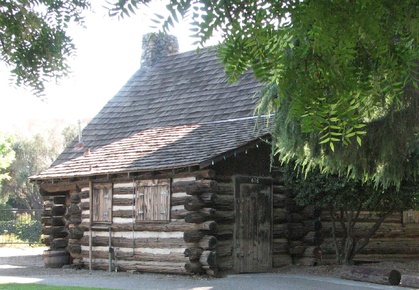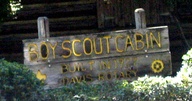The Boy Scout Cabin is one of Davis' historic places. The Davis Boy Scout Cabin was built in 1927 by BSA Troops 139 and 66 with help from the Davis Rotary Club. It was the Rotary Club's first local community project. The scouts built the cabin as a meeting place for activities. The cabin stands on UC Davis-leased land and is located at the intersection of First Street and Richards Blvd. It was made out of wood, stone and cement. Robert Howard, committee chair of the Davis Rotary club, led the Rotary Club and the Davis community to build the scout cabin. Stones for the cabin were gathered by the Boy Scouts and transported from a nearby creek by trucks. Pacific Gas & Electric (PG&E) donated the cedar logs. The other supplies were donated by the Davis Rotary Club.
On February 13, 1950, the Davis Parent Nursery School began operation with 25 children in six surplus army tents erected on property surrounding the Davis Boy Scout Cabin. The log cabin itself was used only for toilet facilities, storage, heat and shelter during inclement weather. For two and a half years the nursery school existed in this much-appreciated yet rather pioneer setting while raising sufficient money for a permanent building. On a weekend in April 1952, the Davis Parent Nursery School moved from the Boy Scout Cabin. In 1982, the Davis Rotary Club renovated the cabin by pouring a new concrete floor and reinforcing building supports.
As early as 1999, the Davis Human Relations Commission debated whether it was appropriate to renew the Boy Scout's sublease on the land occupied by the cabin and gay activists lobbied the university to cancel the lease at one time. The university had been renting the parcel to the Boy Scouts since the construction of the cabin in 1927, but the city took over the lease in order to build a public parking lot at that location. At that time, the Boy Scouts paid the city $1/year for a land tenancy sublease, but co-owned the cabin with the Davis Rotary Club. The Boy Scout Cabin suddenly found itself on city controlled property. By this time, gay activist, Shelly Bailes had been appointed to the Human Relations Commission and appointed its Chair. The city's Human Relations Commission cited the Boy Scouts' stance on not admitting gay leaders and atheists in making its recommendation to the City Council to cancel the lease.
Rallying against the discriminatory policies of the Boy Scouts of America, Davis activists demanded that the local scout troops stand up to the BSA. Shelly, and her life partner, Ellen Pontac, ran a parallel media campaign as private citizens, picketing in front of the cabin, organizing a letter writing campaign, appearing in numerous articles and leading an annual boycott of the local troops annual Christmas Tree fundraiser, etc.
National and some local scout leaders responded that as a private, voluntary organization they are free to do what they like. Other leaders feared that, though they found the policy to be wrong and committed to never enforcing it, BSA National would only pull the charters of Troops that made any public stance. To this, the HRC responded that the local troops could not be protected as a “private” organization and still receive preferential treatment from the city. Finally in the summer of 2000, the Davis City Council, under the leadership of Davis Mayor Ken Wagstaff and Councilwoman Susie Boyd, came to an agreement with the Boy Scouts in closed session. In brief, the parties agreed to prematurely break the city-held lease to the Scouts, vacate the cabin, and transfer the Scouts' interest and UCD-held lease to the City of Davis. The city agreed to compensate the Golden Empire Council, Boy Scouts of America, $80,000 for their portion of the leasehold and purchase the cabin at 616 First Street. This money was eventually given to and evenly divided between the three units who were displaced by the agreement, Troop 66, Troop 139, and Crew 66. The three units then placed this money into an account with the express intent of establishing a new venue for scouting in Davis. The Boy Scouts provided official notice to the city that they vacated the premises on January 23, 2002. (read the agreement)
Today, the cabin is a city designated historical resource. The City of Davis continues to lease the property on which the cabin stands through a $1/year tenancy agreement with UC Davis with an option to purchase the parcel for a paltry $150,000. The City Manager's office is currently working with the city's Planning & Building Department to address handicapped accessibility issues on the property. It is publicly anticipated by city officials that John Natsoulas would take tenancy, utilizing the space for studio and gallery space; rent would be sufficient to cover city costs with Natsoulas responsible for maintenance and clean up. Already, John Natsoulas Art Gallery uses the Davis Boy Scout Cabin, now known as the Log Cabin Gallery, to present exhibits by appointment. It is also, interestingly, on the Yolo County Hazardous Materials list as a contaminated site with diesel detected in the groundwater — the case is still open.
To learn more about Davis history, please visit our pages of Historic Places, Town History and Davis Timeline. Or view a 1944 photo from the Eastman's Originals Collection.
2009-11-10 10:08:45 I think that the way the city of Davis and the HRC forced the Boy Scouts out of their cabin shows how truly regressive this "progressive" town is. Though the BSA nationals espouse a ridiculously stupid and discriminatory policy, the local level shouldn't be punished for it. At the end of the day, the local Boy Scouts do good work for the community, and were forced out of their cabin as a punishment aimed to snub the national level, which didn't even care. Good job Davis. —EliYani
I disagree. Despite the good hearts and actions of the local Scouts and leaders, they pay dues to an organization that is openly discriminatory. There are other groups that perform the same services as Scouts, sans sanctimony. As for the statement that the National organization doesn't care, what other way to make them care than to hurt their bottom line? Debate with them that their God is wrong? —JerseyCity
It gets better: The people responsible for this crap are hailed as heros for their gay rights activism. I didn't know attention-whoring and hurting one group to spite another actually did anything for their cause, but I'm a straight white male who couldn't possibly understand. —wl







Comments:
You must be logged in to comment on this page. Please log in.